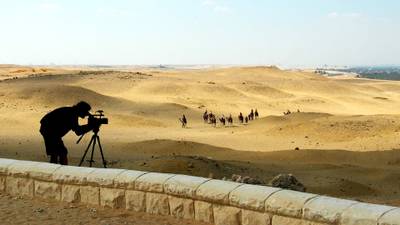Carry out your own ethnographic research project.
Become a confident ethnographic researcher and take your social research skills further with this flexible online course.
We’ll take you through all the stages of a successful small-scale ethnographic research project.
- With the support of a supervisor, you’ll select a topic to explore using ethnographic methods. It might involve a place, organisation or community that you’d like to find out more about.
- We’ll help you use your ethnographic skills to design and carry out the fieldwork, and then write it up into a project report.
Who can join this online ethnography project course?
This distance-learning course is ideal for anyone with prior training in ethnographic research.
This could be an undergraduate degree in social science that includes a component on ethnographic methods, or:

Introduction to Ethnographic Research Methods
Prepare with our introductory online short course. It’s ideal preparation for beginners and you can move on to this practical project course afterwards.
Join our introductory ethnography courseWhat you’ll study
Through recorded lectures and personal online supervision, we’ll cover topics including:
- creating a research proposal
- learning from previous research
- analysing qualitative data, and
- writing up your results.
Week by week, teaching materials will open up new perspectives on doing research and give you the confidence to become a successful ethnographic researcher.
In this course, you’ll:
- select your topic and design your research
- apply for ethical approval
- carry out fieldwork
- analyse your own ethnographic data
- write up your research in a professional style, and
- reflect on your methodology and fieldwork.
As part of your project, you’ll apply for ethical approval for your research through our School of Social Science. Your application will need to be approved before you can proceed to the fieldwork.
By the end of this course, you’ll be able to...
-
Design an ethnographic research project.
-
Carry out real-world ethnographic fieldwork.
-
Analyse ethnographic data and reflect on the process of research.
-
Produce a professional ethnographic report.
Choose the University of Aberdeen for online courses in ethnography

2nd in Scotland
We’re ranked 2nd in Scotland and 8th in the UK for Anthropology and Archaeology in the Guardian University Guide 2026.

Global research expertise
Our staff are involved in ethnographic research all over the world and bring their experiences directly to your teaching.

You’re in expert hands
We’ve been delivering online and distance learning for decades.
How you’ll study
Online learning
This distance learning ethnography project course is delivered flexibly, 100% online.
You can learn with us anywhere in the world, no student visa required, and manage your study hours to suit you.
Your teaching
The course is taught at Masters level.
Teaching is delivered through MyAberdeen, our online Virtual Learning Environment (VLE). It holds all the materials, tools and support you’ll need in your studies. Take a look around MyAberdeen.
You can access your learning materials on computer, smartphone and laptop, 24 hours a day. You’ll access a range of resources created specifically for this course:
- online video lectures and thematic discussions
- reading materials covering contemporary issues in carrying out ethnographic research
- one-to-one supervisor support for developing your project
- course tutor support
- the online resources of our award-winning Sir Duncan Rice Library.
Your course tutor and project supervisor
This course is delivered by our School of Social Science.
You’ll learn from a team of experienced anthropologists. You’ll benefit from their first-hand experience in carrying out ethnographic research across the world.
A dedicated senior course tutor will be on hand to provide you with week-by-week guidance to the resources. They’ll provide individual feedback on the work you submit.
You’ll also have personal support from a supervisor, including online meetings (subject to time zones and working hours) and regular correspondence. Your supervisor will help you design and carry out your project and give advice on your written course submissions.
This course is assessed entirely online via two pieces of writing:
- Research proposal, 1000 words (20% of your final mark)
- Research project, 5000 words (80% of your final mark)
In addition, you’ll apply for ethical approval for your research through our School of Social Science. Your application will need to be approved before you can proceed to the fieldwork.
The course totals approximately 300 hours of study, research and assessment time. That’s around 10 – 15 hours per week over the 23 weeks of the course.
This is an indicative guide to the time required for a typical student at this level to achieve the learning outcomes.
With the support of your supervisor, you’ll develop your own schedule for carrying out fieldwork.
You can largely set your own study hours each week to cover the materials. MyAberdeen is available 24/7, so you can log in and study when it suits you.
Activities at fixed times
There may be some activities scheduled for fixed times. This could include online meetings with your tutor or supervisor. Otherwise, you can access and work through the course at your convenience.
Our first-class support structure will ensure that you aren’t alone in your studies. You’ll have contact with your coordinator via email, MyAberdeen and Microsoft Teams. You can use social media and discussion boards to chat with your fellow students too.
We provide a wide range of services to support you in your studies and beyond:
- Careers and Employability Service
- Disability support
- IT support
- Library support
- Student Support Service – help with finances, wellbeing, and non-academic issues
- Student Learning Service – study skills support and advice
- Aberdeen University Students’ Association (AUSA) – run by students for students
- Toolkit – clever apps and free training that can make your study life easier
Wherever you are in the world, you’ll feel part of our very special Aberdeen learning community.
Your teaching team
Meet your course coordinator and supervisors.
Other staff from our Department of Anthropology may also be able to supervise your project.
Dr Jo Vergunst – Course Coordinator
Jo teaches ethnographic methods in our Department of Anthropology. His research is about people’s experiences of the landscape and he carries out fieldwork in Scotland on land use, walking and cultural heritage. He’s especially interested in the connections between anthropology and creative practice.
View Jo’s profileDr Maggie Bolton
Maggie also teaches ethnographic methods. Her research involves fieldwork in the high Andes of southern Bolivia, where she has worked on mining, human-animal relations and indigenous movements. Her current research project is archival, linking Scotland to Bolivia through the lives of 19th-century migrants.
View Maggie’s profileDr Johan Rasanayagam
Johan has conducted extensive fieldwork in Uzbekistan, Central Asia, where his doctoral dissertation examined the themes of the state and citizenship. His current research interests are in the category of religion and the secular in Muslim contexts, including fieldwork in Morocco.
View Johan’s profileDr Nancy Wachowich
Nancy’s ethnographic research is located mostly in the Canadian High Arctic. It draws on historical anthropology, visual anthropology, oral histories, museums and material culture. Her current research explores the dynamics of Inuit filmmaking, Arctic sewing and handicrafts, community digital archiving projects, colonial autobiographies and efforts to indigenise the internet.
View Nancy’s profileWhere this will take you
This unique course will give you advanced practical experience in ethnographic research projects.
Your research project could make a real difference to the world around you, an organisation that you work for, or a community.
Build your learning
You’ll gain skills to progress your own research career, including pathways into further postgraduate study.
You’ll earn 30 credits at Masters level (SCQF Level 11) with this course. You can use these credits towards further study. Find out more about credits.
Many postgraduate programmes, including PhDs in social science, require experience in ethnographic research methods and this course will give you the experience and confidence to succeed.
You may be interested in progressing towards:
- MLitt Ethnology and Folklore – study on campus, full-time or part-time
- our social science degrees.
Careers
This project course could also be a launch pad into further research in academic or applied fields. The course will develop your skills in designing, carrying out and writing up research that are relevant to:
- the private sector
- government
- public bodies
- charities and voluntary organisations.
Continuing Professional Development (CPD)
Your employer or professional institute may recognise this course for CPD hours. Talk to your employer or institute to find out more.

Free career support
Access our free careers service while you study.
- 1:1 appointments
- CV checks
- Interview prep
- Job opportunities
Entry requirements
Entry requirements
We welcome students from all over the world.
This course has no formal entry requirements. You do not need to provide proof of your qualifications.
But you do need to check the entry guidance above to understand the level of teaching delivered, to decide if this course is right for you.
If you do not have qualifications from the UK, check the equivalent teaching level for your country.
Visa requirements
You do not need a student visa to study online with us.
English language requirements
Teaching is delivered in English.
You do not have to provide proof of your English language skills to join this course. But we want to make sure that you can use English well enough to study successfully.
Recommended level of English
This course uses our Postgraduate Higher level of English language proficiency.
These are our Postgraduate Higher requirements, and these are minimum scores.
IELTS Academic, IELTS UKVI Academic, or IELTS Online (not IELTS Indicator or IELTS General Training)
- 6.5 overall
- 5.5 for listening and speaking
- 6.0 for reading and writing
TOEFL iBT or TOEFL iBT Home Edition
- 90 overall
- 17 for listening
- 21 for reading
- 20 for speaking
- 21 for writing
- TOEFL DI code is 0818
Cambridge English: B2 First, C1 Advanced, or C2 Proficiency
- 176 overall
- 162 for listening and speaking
- 169 for reading and writing
LanguageCert Academic / LanguageCert Academic SELT
- 70 overall
- 60 for listening and speaking
- 65 for reading and writing
Oxford ELLT Digital – English Language Level Test Online
- 7.0 overall
- 5.0 for listening and speaking
- 6.0 for reading and writing
PTE Academic (online test not accepted)
- 62 overall
- 59 for listening, reading, speaking and writing
Skills for English: SELT
- B2 pass with merit
Duolingo – tests taken from 1 July 2024 onward
- 120 overall
- 95 for listening and speaking
- 105 for reading and writing
University of Aberdeen English Pre-sessional Programme (PSE)
- Pass
- Valid for one year. Refresher can be offered if out of date
Pre-sessional academic English preparation programmes undertaken at other UK universities
- Pass at an equivalent of 6.5 (C1)
- B2 in all four skills
- Certification must be within one year prior to the start of your course
For more information about language qualifications see our English Language Requirements page.
You will need access to:
A computer (PC, laptop or Mac) with an up-to-date operating system
Most teaching materials are smartphone- and tablet-friendly. But we recommend a proper laptop or desktop for completing assignments comfortably.
Reliable internet access
We recommend:
- a wired connection
- a minimum download speed of 2 Mbps so you can take part fully in live sessions.
Speakers or headphones
- We recommend a headset with built-in microphone and earphones if you’re likely to study in an environment with background noise.
- A webcam is optional, but you may like to use one for some interactive sessions.
Software
We’ll give you access to Office365 applications. This means you can use online versions of Microsoft Word, Excel, PowerPoint and OneDrive and install these programs on up to five personal devices.
If your course requires specialist software, we’ll provide you with access to this and a licence that lasts throughout your studies.
See our detailed IT requirements for more information.
When you study with us, you can expect a first-class support structure so that you’re never alone in your studies.
But learning online does mean you have to motivate yourself and manage your own time.
Your most important commitment will be time – the time to work through, reflect on and understand your teaching materials.
Before you start a course that involves a high degree of independent study, we recommend looking at the time you will be able to devote to your studies each week:
- Be realistic
- Create a weekly schedule as a guide
If you have any questions about studying online, get in touch with our friendly team. We’re here to help.
Fee payment
Your course fee needs to be paid in full before you start your course.
We accept payment via Visa Debit, Visa Credit and Mastercard.
Ways to save
You may be able to get help funding this course via:
- discounts – if any discounts are available for this course, they’ll appear in the section below
- employer sponsorship – we accept full and partial fee payments from sponsors.
Find out more about funding options.
Student card
All our students are entitled to a University of Aberdeen student card. This gives you access to a range of student discounts around the city and online.
This course is delivered at Masters level. You will need to have suitable prior training or experience in ethnographic methods in order to successfully complete the course. This could be:
- an undergraduate degree in social science with a component of ethnographic research methods, with a 2:2 or above
- successful completion of our online short course Introduction to Ethnographic Research
- or relevant professional experience for this level of study.































